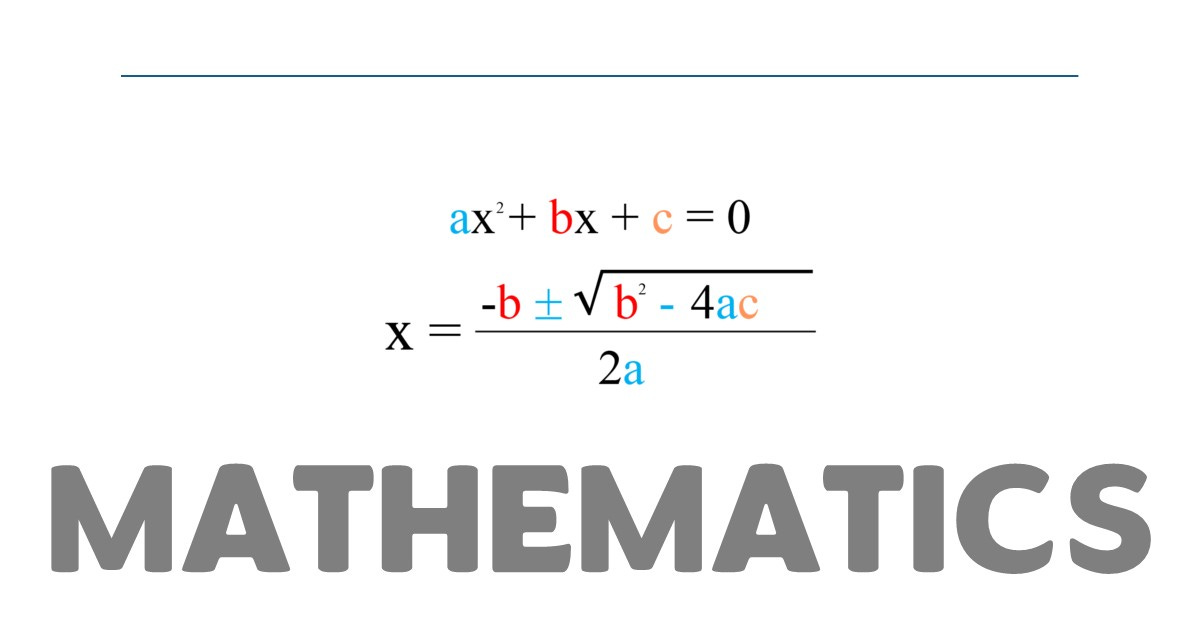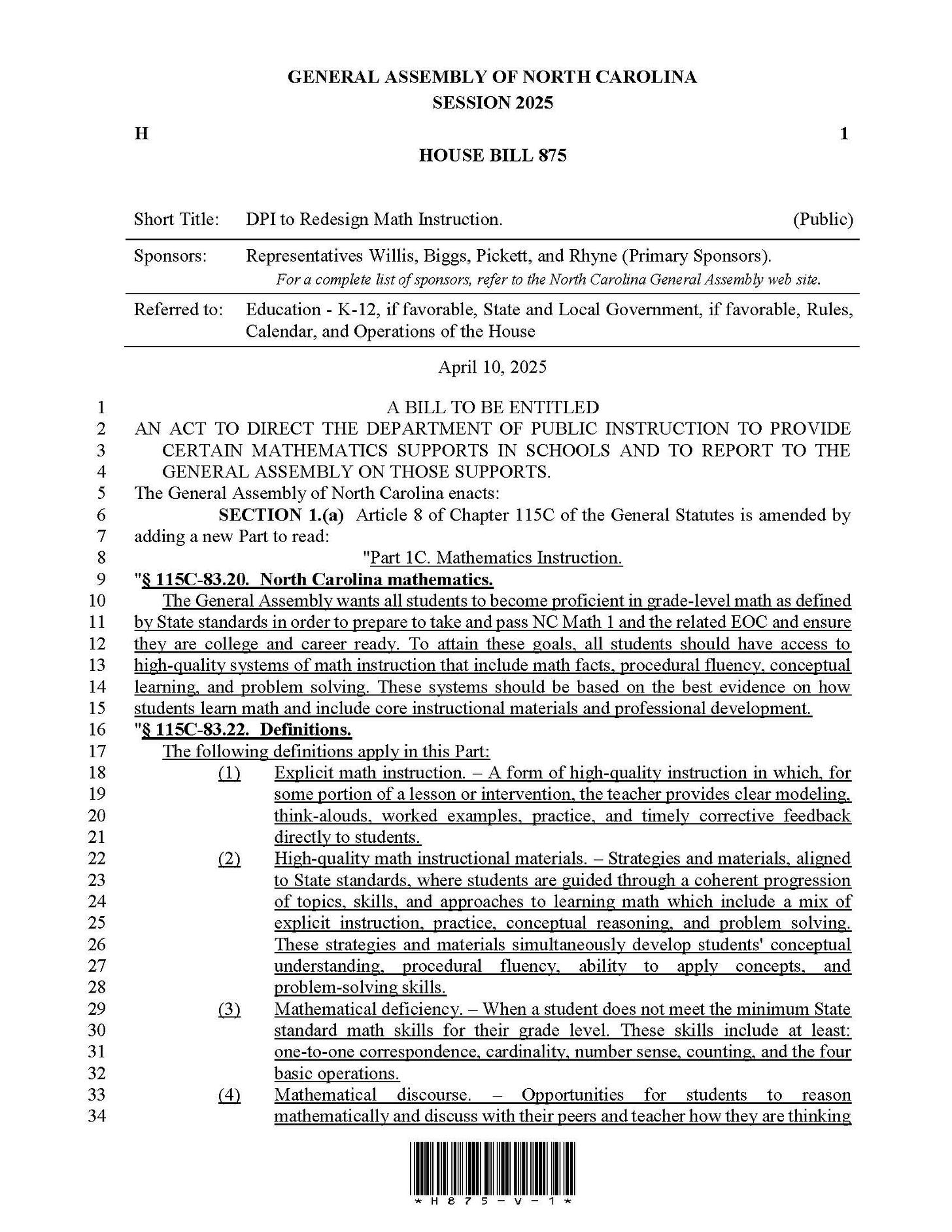North Carolina Lawmakers Push for Overhaul of K–8 Math Instruction
House Bill 875 is in response to mounting concerns over declining student performance in math testing.
“To attain these goals, all students should have access to high-quality systems of math instruction that include math facts, procedural fluency, conceptual learning, and problem solving. These systems should be based on the best evidence on how students learn math and include core instructional materials and professional development.” — House Bill 875, Section 1
Holly Springs, NC, Apr. 24, 2025 — A sweeping new proposal in the North Carolina General Assembly seeks to fundamentally reshape how mathematics is taught in the state’s public elementary and middle schools. House Bill 875, titled "DPI to Redesign Math Instruction," was filed on April 10, 2025, and is now under consideration by state lawmakers. If passed, it would direct the Department of Public Instruction (DPI) to develop a statewide, evidence-based framework for math instruction targeting students from kindergarten through 8th grade.
The bill, sponsored by Representatives David Willis (R–68), Brian Biggs (R–70), Ray Pickett (R–93), and Heather Rhyne (R–97), responds to mounting concern over declining student performance in math — a trend exacerbated by the COVID-19 pandemic. Recent NAEP scores show that only 31% of North Carolina eighth graders were proficient in math in 2024, a modest increase from 25% in 2022 but still significantly below pre-pandemic levels.
What the Bill Would Do
House Bill 875 outlines a multi-pronged strategy to help students achieve grade-level proficiency in math, prepare them for NC Math 1 (typically taught in 8th or 9th grade), and improve long-term academic outcomes. Key elements of the legislation include:
Approved Screening Tools: Districts would be required to use DPI-approved supplemental math systems to screen students, monitor progress, and identify mathematical deficiencies, including signs of dyscalculia.
Intervention Requirements: Students identified as behind would receive targeted support using structured, problem-based learning materials. These must be aligned with state standards and designed to reinforce conceptual understanding, procedural fluency, and application skills.
Parent Notifications: Families would receive notice within 15 days if their child is identified as having a math deficiency, along with a breakdown of the interventions planned and strategies for supporting learning at home.
Professional Development: K–8 math teachers would undergo state-approved training focused on delivering high-quality, explicit instruction and making use of technology to provide responsive feedback.
Notably, the bill does not mandate the use of specific products or curricula. Instead, it empowers DPI to curate approved lists of instructional materials, diagnostic tools, and teacher training programs that meet rigorous pedagogical criteria.
The Rationale Behind the Reform
Supporters of the bill argue that too many students are entering high school — and eventually the workforce — without a firm grasp of essential math skills. Inconsistent instructional quality, lack of early intervention, and limited teacher training in effective math strategies have all been cited as contributing factors.
The bill echoes reform efforts underway in other states. Arkansas, Kentucky, Indiana, and Iowa have each passed legislation in recent years to bolster math instruction, including early screening, teacher training, and automatic placement into advanced coursework for proficient students.
Although the bill is closely modeled on successful state-level strategies, there has been no public endorsement or opposition from the North Carolina Department of Public Instruction, the North Carolina Association of Educators, or Wake County Public School System as of this writing.
Weighing the Pros and Cons
Pros:
Encourages consistent, evidence-based math instruction statewide
Targets struggling learners early through diagnostics and intervention
Enhances professional development for teachers
Facilitates better parent engagement in student learning
Aligns with national trends in math education reform
Cons:
Implementation could strain district budgets and infrastructure
May limit local flexibility in selecting instructional materials
Heavy emphasis on standardization could reduce instructional creativity
Relies on technology, which may not be equally accessible in all districts
Does not outline long-term monitoring or accountability mechanisms
What’s Next?
House Bill 875 has been referred to the House Committee on Education – K-12. If it receives a favorable vote, it will then proceed to the State and Local Government Committee, followed by the House Rules Committee. If passed into law, the bill will take effect for the 2025–2026 school year.
The DPI would be required to submit a comprehensive report to the Joint Legislative Education Oversight Committee before implementing new math standards, detailing its planned instructional support systems and selected materials.
Residents interested in following the bill's progress or providing public comment can do so through the North Carolina General Assembly website or by contacting their representatives in the House and Senate.
Legislators Serving Our Area
NC House District 36
Representative Julie von Haefen (Democrat)
Email: Julie.vonHaefen@ncleg.govNC House District 37
Representative Erin Paré (Republican)
Email: Erin.Paré@ncleg.govNC Senate District 17
Senator Sydney Batch (Democrat)
Email: Sydney.Batch@ncleg.gov


